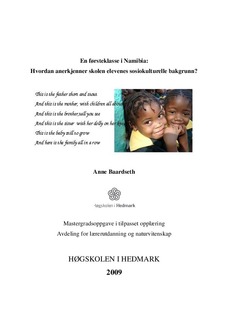| dc.description.abstract | Norsk: Skolesystemene i mange land i Afrika bygger på vestlige verdier, og innholdet kritiseres for å være fjernt fra elevenes hverdag. Skoleelever i Namibia scorer dårligere på lesing, skriving og regning enn elever fra flere andre afrikanske land. Jeg har fulgt en førsteklasse i Namibia ved skolestart og sett på hvordan skolen anerkjenner elevenes sosiokulturelle bakgrunn. Anerkjennelse av elevenes sosiokulturelle bakgrunn er en forutsetning for at integrerende sosialisering skal kunne finne sted. Integrerende sosialisering innebærer at elevene får sin identitet bekreftet samtidig som det foregår en perspektivutvidelse, gjennom delvis eller fullt interessefellesskap og verdifellesskap mellom hjem og skole. Jeg har gjort en casestudiene, hvor jeg har observert mer og mindre strukturert, intervjuet en lærer, fire elever og deres familier, samt studert styringsdokumenter, planer og læremateriell. Ved hjelp av disse metodene har jeg funnet at undervisningen i 1.klasse er preget av rask progresjon og mye repetisjon. Innholdet i undervisningen er i stor grad løsrevet fra konteksten, og den mest brukte arbeidsmåten er korsnakking. Alle læremidlene er imidlertid produsert lokalt. Elevene får i liten grad anerkjent sin språklige bakgrunn, og noen av elevene må bruke et navn de ikke kjenner til på skolen. Det er i stor grad interessefelleskap mellom hjemmene og skolen, mens det ser ut til at det er for stor verdikonflikt mellom flere av hjemmene og skolen, til at integrerende sosialisering skal kunne finne sted.
English: A 1st grade in Namibia: How do the school acknowledge the pupils’ sociocultural background? The educational systems in many African countries are based on western values, and the curricula are criticized for being distant from the pupils’ everyday life. Namibian pupils have lower scores in reading, writing and mathematics than pupils from many other African countries. I did my research in a Namibian 1.st grade for the first three weeks at school. My main question was how the school acknowledge the pupils’ sociocultural background. Acknowledging the pupils’ sociocultural background is a condition to make integrating socialization possible. Integrating socialization imply that the pupils get their identity recognized at the same time as new perspectives are added. For this to happen, there have to be partly or completely fellowship in interests and values between the home and the school. I did a case study, which included more and less structured observation. I interviewed a teacher, four pupils and their families, and I also studied government documents, plans and teaching material. By means of these methods I found that the teaching in 1st grade is characterized by a fast progression and repetition. The content of the teaching is often separated from the context, and the most common teaching method is talking as a choir. All the teaching material is local produced. The pupils don’t get their language acknowledged, and some of the pupils have to use a name they are not familiar with at school. There is a fellowship in interests between the homes and the school, but it seems like the conflict in values are too big between some of the homes and the school. This means that the conditions for integrated socialization are not complete. | en |
